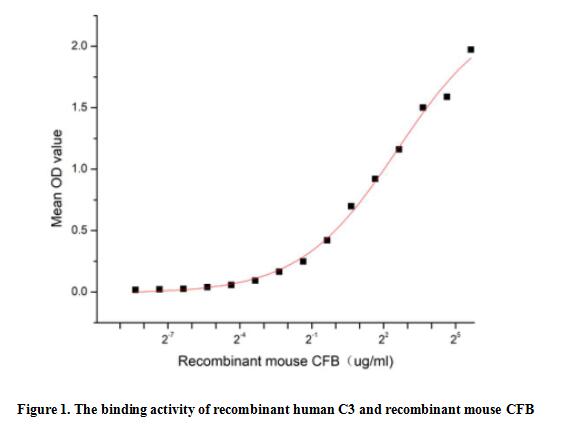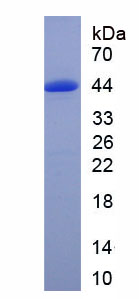Active Complement Component 3 (C3) 

ASP; CPAMD1; Complement Protein C3; C3 and PZP-like alpha-2-macroglobulin domain-containing protein 1; C3a anaphylatoxin; Acylation stimulating protein
Overview
Properties
- Product No.APA861Hu01
- Organism SpeciesHomo sapiens (Human) Same name, Different species.
- ApplicationsCell culture; Activity Assays.
Research use only - DownloadInstruction Manual
- CategorySignal transductionInfection immunityImmune molecule
- Buffer FormulationPBS, pH7.4, containing 0.01% SKL, 5% Trehalose.
- Traits Freeze-dried powder, Purity > 95%
- Isoelectric Point6.0
Sign into your account
Share a new citation as an author
Upload your experimental result
Review

Contact us
Please fill in the blank.
Activity test

Complement Component 3 (C3) is a vital component of the complement system that plays a central role in immune response and inflammation. C3 is a β₂ globulin synthesized by the liver, whose structure consists of two polypeptide chains, α and β, and is the most abundant complement component in serum. It's been identified that C3 can interact with Complement Factor B (CFB), thus a functional binding ELISA assay was conducted to detect the interaction of recombinant human C3 and recombinant mouse CFB. Briefly, CFB was diluted serially in PBS with 0.01% BSA (pH 7.4). Duplicate samples of 100 μl were then transferred to C3-coated microtiter wells and incubated for 1h at 37℃. Wells were washed with PBST and incubated for 1h with anti-CFB pAb, then aspirated and washed 3 times. After incubation with HRP labelled secondary antibody for 1h at 37℃, wells were aspirated and washed 5 times. With the addition of substrate solution, wells were incubated 15-25 minutes at 37℃. Finally, add 50 µL stop solution to the wells and read at 450/630 nm immediately. When Recombinant C3 is immobilized at 2 ug/mL (100 uL/well), the concentration of CFB that produces 50% optimal binding response is found to be approximately 5.96 ug/mL.
Usage
Reconstitute in 10mM PBS (pH7.4) to a concentration of 0.1-1.0 mg/mL. Do not vortex.
Storage
Avoid repeated freeze/thaw cycles. Store at 2-8°C for one month. Aliquot and store at -80°C for 12 months.
Stability
The thermal stability is described by the loss rate. The loss rate was determined by accelerated thermal degradation test, that is, incubate the protein at 37°C for 48h, and no obvious degradation and precipitation were observed. The loss rate is less than 5% within the expiration date under appropriate storage condition.
Increment services
-
 BCA Protein Quantification Kit
BCA Protein Quantification Kit
-
 Molecular Mass Marker for Protein
Molecular Mass Marker for Protein
-
 Monoclonal Antibody Customized Service
Monoclonal Antibody Customized Service
-
 Polyclonal Antibody Customized Service
Polyclonal Antibody Customized Service
-
 Protein Activity Test Experiment Service
Protein Activity Test Experiment Service
-
 Electrophoretic Mobility Shift Assay (EMSA) Experiment Service
Electrophoretic Mobility Shift Assay (EMSA) Experiment Service
-
 Buffer
Buffer
-
 Lentivirus Packaging Experiment Service
Lentivirus Packaging Experiment Service
-
 Adenovirus Packaging Experiment Service
Adenovirus Packaging Experiment Service
-
 Real Time PCR Experimental Service
Real Time PCR Experimental Service
-
 Spike RBD Protein (S-RBD)
Spike RBD Protein (S-RBD)
-
 Protein G
Protein G
-
 Protein A
Protein A
Citations
- Experimental Research With Synthetic Copolymer-Coated Cardiopulmonary Bypass Circuits: Inflammatory and Thrombogenicity AnalysisWiley: source
- Complement activation contributes to the injury and outcome of kidney in human anti-glomerular basement membrane disease.PubMed: 22941511
- Beneficial effects of omega-3 fatty acids in the proteome of high-density lipoprotein proteomePubMed: PMC3480889
- Human IgG Antinuclear Antibodies Induce Pregnancy Loss in Mice by Increasing Immune Complex Deposition in Placental Tissue: In Vivo StudyPubMed: 26388133
- Oral administration of heat-inactivated Mycobacterium bovis reduces the response of farmed red deer to avian and bovine tuberculinPubmed:27032499
- Identification of Serum Peptidome Signatures of Non-Small Cell Lung CancerPubmed:27043541
- Comparative proteomics of milk fat globule membrane in goat colostrum and mature milkPubmed:27173528
- Generation of complement protein C3 deficient pigs by CRISPR/Cas9-mediated gene targeting. pubmed:28694465
- The response of red deer to oral administration of heat-inactivated Mycobacterium bovis and challenge with a field strain.pubmed:28888638
- iTRAQ‐Based Proteomic Analysis Reveals Protein Profile in Plasma from Children with AutismPubmed:29274201
- An OMV-Based Nanovaccine Confers Safety and Protection against Pathogenic Escherichia coli via Both Humoral and Predominantly Th1 Immune Responses in …Pubmed: 33233490
- Systemic Alterations of Immune Response-Related Proteins during Glaucoma Development in the Murine Model DBA/2JPubmed: 32585848
- The bovine cumulus proteome is influenced by maturation condition and maturational competence of the oocytePubmed: 32555221
- Complement component 3 prevents imiquimod-induced psoriatic skin inflammation by inhibiting apoptosis in micePubmed: 32535539
- Effects of chitooligosaccharide supplementation on laying performance, egg quality, blood biochemistry, antioxidant capacity and immunity of laying hens during the …
- A deep-sea pathogenic Bacillus subtilis isolate employs different strategies to escape the killing of teleost and murine complements33545212
- Effect of alfalfa hay and starter feed supplementation on caecal microbiota and fermentation, growth, and health of yak calves33610512
- The suppression of Brd4 inhibits peripheral plasma cell differentiation and exhibits therapeutic potential for systemic lupus erythematosus
- Maternal Serum Proteomic Profiles of Pregnant Women With Type 1 Diabetes34940989







